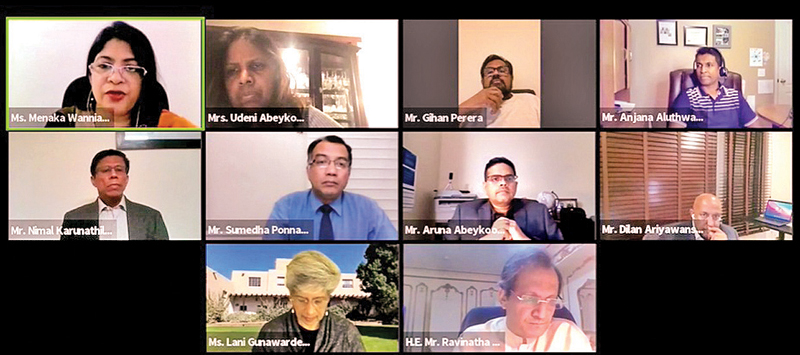At a webinar held recently, over 40 Sri Lankan registered exporters, engaged with 10 selected business entrepreneurs identified by SLEMB/DC, following its State level interactions of the recently constituted Overseas Sri Lankans (OSL) Network. The event was also live streamed through social media of the Chamber, making the discussion accessible to a broader base of those interested in exporting to the USA. Moving forward, it was agreed to conduct sector specific dialogues, where the Sri Lankan exporters will be provided with the opportunity to engage in discussion with the business community of the particular sector, in order to foster mutually beneficial trading relationships. Further a separate event is proposed as a dialogue to enhancing long term trade related relationships such as partnerships, Franchise and Investment opportunities between the two countries.
Inaugurating the session, Sri Lanka’s Ambassador to the USA Ravinatha Aryasinha said, while increasing the value of apparel exports to the US, a concerted effort is presently being made to diversify the export product basket to US. He noted that while the USA has remained the largest single buyer of Sri Lanka’s exports since 1979 and in 2019 had a share of 26.3% of all exports, the products basket to the US had seen very little diversification. Apparel has been the dominant export item accounting for 74.5% of the total value, and did not benefit from GSP facility. The rest which enjoyed GSP, were mainly rubber based products which accounted for 7%, and the other products included tea, iron and steel articles, activated carbon, precious and semi-precious stones and sea food. The Embassy was reaching out to the OSL community in the US and to Americans who are interested in doing business with Sri Lanka and helping them in identifying the products which they could import from Sri Lanka to the US. The increased production of some of these products, could also encourage greater US investment in to Sri Lanka.
In the discussion that followed led by Chairman of the NEC Shiham Marikkar, focused on obstacles faced by importers when importing from Sri Lanka including quality assurance, pricing, promotion and communication and shipping and logistics. The need for adaptation to the largely e-commerce marketing strategies to increase exports. SLEMB/DC Minister (Commercial) Sumedha Ponnamperuma shared insights on the introduction of the US market, import system and current trends.
Management Committee:
President: Mr. Ravi Jayawardena, Vice President: Mr. Jayantha Karunaratne, Vice President: Mr. Indra Kaushal Rajapaksa, Immediate Past President: Mrs. Ramya Weerakoon, Past President: Mr. Ramal Jasinghe, Hony. Secretary: Mr. Dilshan Rajapaksa, Hony. Treasurer: Mr. Rajeev De Silva, Hony. Assistant Secretary: Mrs. Thushari Weerakoon, Hony. Assistant Treasurer: Mr. Lakshan Algama, 1 Representatives from the Council: Mrs. Nilrukshi De Silva & Mr. Farhath Amith
The participating Sri Lankan professionals residing and doing business in USA shared insights regarding the current market conditions and the opportunities available. Mr. Aruna Abeykoon from Las Vegas discussed obstacles faced by importers when importing from Sri Lanka, Mr. Jeevaka Fernando from Laos Angeles shared his experience on aspects related to Quality assurance, pricing, promotion and communication. Mr. Anjana Aluthwatte provided insights on sales and marketing strategies in the USA, Mr. Rick Miller from Virginia explained about the shipping and logistics including the including the potential to increase warehouse facilities to help mainly the SMEs exporting to the US in smaller quantities, Mrs. Udeni Abeykoon from New York focused on the selling of Apparel Products in the US market online and marketing strategies to increase exports, while Mr. Jeevaka Fernando from Los Angeles elaborated on important aspects regarding quality assurance, pricing, promotion and communication. Former Director General/Department of Commerce of Sri Lanka Nimal Karunathilake also shared his experience regarding the regulatory aspects of the USA market.
Some of the key highlights of the discussion were; • US is a highly competitive market due to the size of the market as well as the prominence in the world economy, therefore the businesses often dominate the trading terms. It is important for the exporters to understand this background when negotiating their business, as well as be well prepared to face challenges. The customs system and the import structure is unique and complex. Importers operate separately from the vendors.
• The importers face challenges when importing from Sri Lanka due to issues arising in quality, commitment and seriousness of exporters. Further lack of knowledge on the regulations in US market was also highlighted. Therefore, it is important to keep the commitment to source products as and when required, quality of the product as agreed.
• Discussing regarding GSP scheme, it was informed that the US GSP for Sri Lanka has expired on 31st December 2020 and currently the US Congress is in the process of deciding the next phase of GSP Scheme for all countries. Further discussing the beneficiary products range, it was mentioned that the Sri Lankan Exporters are requested to submit their suggestions to be included in the GSP eligible product list, when it comes for review of the scheme later in 2021.
• Another key feature that was highlighted was the quality. Quality is important, from process to storing stages, therefore the exporters need to be aware of different quality standards they have to comply with as well as the overall offering of the product.
• Pricing plays a key role and it is expected to be consistent. When exporters determine prices, it is important to analyze pricing elements in a broader perspective, including raw material, processing, transportation costs, storage costs, custom tariffs and insurance costs.
• It is important to support the SMEs and help them expand in the market as they could bring in quality products.
• US market due to its complexity and different regulations, finding partners is one of the key strategies to overcome barriers in exporting to US. The partners are often well conversant to cater to the market needs as well as assist the exporters to comply with the regulatory requirements. Further it is seen as an advantage regarding communication with multiple stakeholders given that partners are present in the US Market. Further another aspect to be mindful is the time differences between Sri Lanka and different zones.
• With the current situation there is a surge in usage of online platforms for selling and for marketing. However, it is important to focus on brand building rather than solely focusing on selling.
•Discussing regarding the apparel sector exports to USA, it was highlighted that the shopping patterns of people have drastically changed. More people prefer online shopping to physical stores and USA is a price sensitive market with high competition from competitors such as China and Bangladesh. However, the consumers are concerned regarding purchases from China, and this could be a positive opportunity for the Sri Lankan exporters in the sector. Another noteworthy change that has occurred in this sector is the reduction of stock turn-around time, as the consumers change their preference rapidly, as opposed in the past, further season specific colors and styles are preferred, and therefore the Sri Lankan Exporters should be ready to cater to the demand.
• Focusing on logistics, strategically locating businesses activities are important to ensure delivery on right time in right quantities, hence focusing on the timing and direction. East coast is one the convenient areas to reach the market, given the times and the convenience in reaching from Sri Lanka. The USA cities are connected with a rail road; therefore, it takes 3 to 10 days generally. For exporters who are hoping to expand in e-commerce, 19 to 20 days’ transit time is to be specially considered and for the exporters with smaller shipments, especially LCLs, it is important to select transit locations wisely in order to reap the best benefits of market opportunity.
The National Chamber of Exporters of Sri Lanka (NCE) is the only private sector Chamber which exclusively provides services to Sri Lankan Exporters, who make a vital contribution to the economy of Sri Lanka earning valuable foreign exchange. The Chamber has a membership of over 500 export companies, including some of the biggest Export houses in Sri Lanka, as well as a number of SME exporters. They are responsible for over half of the foreign exchange earnings of the country.
With a view to engage in successful market access promotional activities, the NCE is coordinating with all Sri Lankan Mission and their trade officers to jointly create awareness on the new market needs. Currently plans have been made to conduct a series of webinars, to provide valuable informative insights to the Exporters as well as connect them to relevant stakeholders.
The Chamber would like to invite Sri Lankan exporters to hold hands with the chamber’s initiative to enable expanded market access, whereby the destinations where proud Sri Lankan brands reach are expanded. Interested Sri Lankan exporters are encouraged to contact the chamber via nce@nce.lk to indicate your interest in participating in future event, where the Chamber will register you accordingly.

HE Ravinatha Aryasinha






















